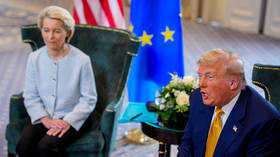Asia has alternative to SWIFT – media

The Asian Clearing Union (ACU) – a nine-member group of central banks including those of India, Pakistan and Iran – has decided to launch a new cross-border financial messaging system in June, as an alternative to SWIFT, according to the Iranian newspaper Kayhan.
The daily cited Central Bank of Iran deputy governor Mohsen Karimi as saying the new payment system is capable of completely replacing SWIFT and could facilitate the global de-dollarization push.
The regulator reportedly stated last week that the new financial system will be used only by ACU member-states, but that others, including sanctioned countries like Syria, could apply for membership. Belarus and Mauritius have already reportedly reached out to the union.
Speaking at the ACU meeting in Tehran last week, Central Bank of Iran governor Mohammad Reza Farzin claimed that dropping the US dollar would help to protect member states’ foreign exchange reserves while still enabling effective settlement of bilateral trade deals.
Iran’s economy minister recently revealed that less than 10% of the US-sanctioned country’s international trade was being conducted using the dollar, down from 30% two years ago.
Russia started developing its own national payment system when the US first targeted the country with sanctions in 2014. Last year, when Moscow was hit by further sanctions in response to its military operation in Ukraine, including the blocking of many Russian banks from SWIFT, the government started promoting the domestic system as a reliable alternative. Russia’s SPFS ensures the transfer of financial messages between banks both inside and outside the country. According to the Russian Central Bank, the system now has 469 participants, including 115 foreign entities from 14 nations.
For more stories on economy & finance visit RT's business section












